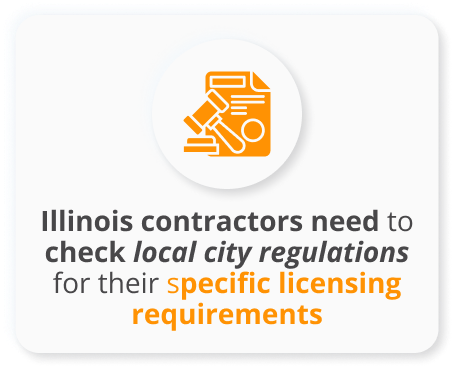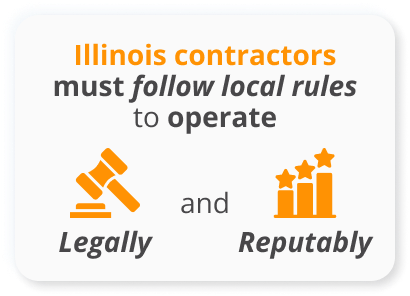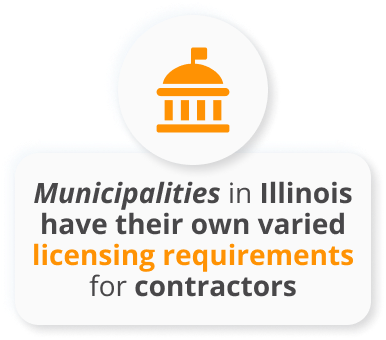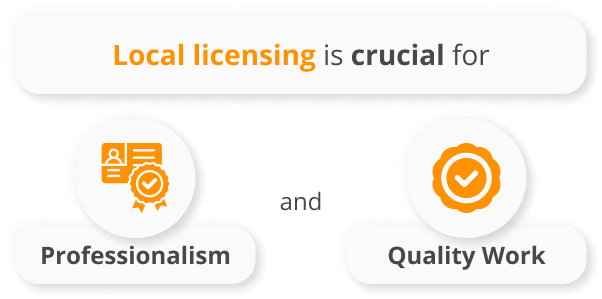Mastering Contractor Licensing in Illinois: Your Essential Guide to Local Compliance and Success in Construction! Get your General Contractor License in Illinois.
Explore the diverse landscape of contractor licensing in Illinois. From the bustling streets of Chicago to the unique requirements of local municipalities, our comprehensive guide demystifies the process, ensuring your construction endeavors are built on a foundation of compliance and expertise.
The Illinois Department of Financial and Professional Regulation (IDFPR) offers details on obtaining contractor licenses in the state.
Contact Information:
Web: Web: Illinois Department of Financial and Professional Regulation (IDFPR)
Alternate Phone Number: 512-463-6599 (For calls outside Texas)
Alternate Phone Number: 512-463-6599 (For calls outside Texas)
Phone: (888) 473-4858
Alternate Phone Number: 512-463-6599 (For calls outside Texas)
Alternate Phone Number: 512-463-6599 (For calls outside Texas)
Address:
Main Office: 555 West Monroe Street, 5th Floor, Chicago, IL 60661
The IDFPR website offers detailed guidance on licensing requirements, application procedures, exam information, and insurance obligations for contractors in Illinois.
Introduction to Contractor Licensing in Illinois
Illinois does not have a state-level license requirement for general contractors. However, most municipalities within Illinois do have their own licensing or registration requirements for general contractors. These requirements can vary from municipality to municipality, so it is important to check with the specific municipality where you will be working to determine the specific requirements.
Venturing on a construction or home improvement project in Illinois comes with its own set of rules and regulations. Unlike many states, Illinois does not mandate a state-level license for general contractors. This unique approach places the onus on you, the contractor, to be well-informed about the specific licensing requirements of each municipality where you plan to work. The landscape of regulations can vary significantly from one locale to another, making it crucial to conduct thorough research and ensure compliance with local laws before starting any project.
In Illinois, contractor licenses are categorized into three primary types:
- General Contractor License: This is the broadest license, allowing for construction and improvement on various structures following the Illinois Building Code.
- Specialty Contractor License: Tailored for contractors focusing on a specific trade such as electrical, plumbing, or HVAC work, this license requires proof of expertise in the chosen field.
- Home Improvement Contractor License: Targeted at those who work on residential buildings, this license covers a range of home improvement tasks from structural work to aesthetic enhancements like painting or flooring.
Each type of license has its own set of prerequisites, from educational qualifications to trade-specific exams. As you navigate the licensing process, remember that the absence of a state-level requirement does not diminish the importance of being properly licensed at the local level. It’s a testament to your professionalism and commitment to quality workmanship, ensuring that all projects are completed safely and to the highest standards.
Variations in Licensing Requirements Across Municipalities
In the state of Illinois, the journey to becoming a licensed contractor is not a one-size-fits-all process. Each municipality holds the authority to establish its own set of rules and prerequisites for contractors wishing to operate within its boundaries. This decentralized approach to licensing means that a contractor who is compliant in one city may not meet the requirements in another. It is imperative for contractors to engage with local government offices to ascertain the specific licensing needs, fees, and any additional mandates that may be in place.

The Necessity of Local Compliance for General Contractors
For general contractors, this localized licensing landscape underscores the importance of due diligence. Before starting any project, it is crucial to verify and adhere to the local regulations. This not only ensures legal operation but also instills confidence in clients, knowing that their chosen contractor is knowledgeable and compliant with the most current local standards. Failure to comply can result in legal repercussions, project delays, and potential fines, tarnishing a contractor’s reputation and financial standing.

Insurance and Bonding: Pre-Work Essentials
Before the first tool is lifted or the initial blueprint is drawn, contractors in Illinois must secure the foundational elements of insurance and bonding. These are not mere formalities but critical components that protect both the contractor and the client throughout the duration of the project.

Understanding General Liability Insurance:
- Purpose: This insurance is a cornerstone of contractor protection, designed to cover legal fees, medical expenses, and damages if accidents or property damage occur during a project.
- Coverage Variations: Depending on the municipality, the required coverage can vary significantly. For instance, Chicago’s requirements range from $1 million to $5 million, based on the project’s value.
- Client Assurance: Carrying adequate insurance not only complies with legal requirements but also serves as a trust signal to your clients, ensuring their property and interests are safeguarded.
The Role of Surety Bonds:
- Contractual Assurance: A surety bond is a three-party agreement between the contractor, the client, and the surety company. It ensures the contractor fulfills their obligations as per the contract and adheres to local building codes.

- Financial Protection: In the event of a contractual breach, the bond provides financial compensation to the client, thus maintaining the integrity of the construction industry.
- Municipality Requirements: While Illinois doesn’t mandate a general contractor license, many local governments require a surety bond as part of their licensing process.
Letters of Credit:
- Financial Backing: A letter of credit is a guarantee from a bank that a contractor has a certain amount of funds available, which can be used to cover liabilities or project mishaps.
- Client Confidence: It acts as a financial safety net, assuring clients and municipalities that the contractor is capable of managing the financial aspects of a construction project.
Chicago’s Licensing Landscape: Tailored to Project Values
Chicago’s License Classes: A Structured Approach to Project Valuation
- Class-Based Licensing: Chicago’s unique licensing system categorizes contractors based on the monetary value of the projects they undertake. This classification ensures that contractors are matched with projects that align with their financial and operational capabilities.
- Fee Correlation: The licensing fees are directly proportional to the project value brackets. For instance, a Class A license, with a $2,000 fee, permits contractors to handle projects of unlimited value, while a Class E license limits contractors to projects up to $500,000 for a fee of $300.
Detailed Fee Structure:
| License Class | Project Value Limit | Application Fee | Annual Renewal Fee |
|---|---|---|---|
| Class A | Unlimited | $4,200 | $2,100 |
| Class B | $2 million | $3,600 | $1,800 |
| Class C | $500,000 | $2,400 | $1,200 |
| Class D | $250,000 | $1,800 | $900 |
| Class E | $50,000 | $1,200 | $600 |
General Contractor License: The Road to Certification
- Eligibility Criteria: To qualify for a general contractor license in Chicago, applicants must fulfill several prerequisites, including age, residency, and a clean criminal record.
- Educational and Experience Requirements: A prelicensure education course and a trade exam are often required, ensuring that contractors possess the necessary knowledge and skills to comply with the Illinois Building Code.
- Financial Security: Applicants must also secure a surety bond or letter of credit, providing a financial safety net for clients and reinforcing the contractor’s commitment to fulfilling their contractual obligations.

By understanding the specifics of Chicago’s licensing requirements, contractors can strategically select the license class that best suits their business model, ensuring they are equipped to handle projects within their financial and operational scope while maintaining compliance with local regulations.
Specialty Contractor Licenses: Niche Expertise in Illinois
Defining Specialty Contractor Licenses:
- Trade-Specific Focus: Specialty contractor licenses in Illinois are designated for professionals focusing on a particular trade, such as electrical, plumbing, or HVAC work.
- Scope of Work: These licenses allow contractors to legally perform specialized tasks within their trade, ensuring that they have the necessary expertise to meet industry standards and safety regulations.
General and Trade-Specific Licensing Requirements:
- Universal Prerequisites: All specialty contractors must be at least 18 years old, possess a valid Social Security number, be a resident or have a business in Illinois, and pass a criminal background check.
- Experience and Education: Depending on the trade, additional experience or education may be necessary. For instance, electrical contractors are expected to have a minimum of four years of experience in their field.
Home Improvement Contractor License: Enhancing Illinois Residences
Scope of Residential Work:
- Home Improvement Defined: In Illinois, home improvement work encompasses a wide range of services, including exterior and interior renovations, structural work, and updates to electrical, plumbing, or HVAC systems within residential buildings.
Pathway to Licensure:
- Eligibility Criteria: Similar to general and specialty contractors, home improvement contractors must meet basic age and residency requirements, along with a clean criminal record.
- Educational Foundation: A prelicensure education course is typically required to ensure contractors are well-versed in building codes, safety practices, and the specific nuances of residential work.
- Trade Exam: Passing a trade exam validates the contractor’s knowledge and proficiency in home improvement tasks, ensuring they are equipped to deliver quality work to homeowners.
Frequently Asked Questions (FAQ)
These are common questions about General Contractor License in Illinois.
No, Illinois does not require a state-level license for general contractors. However, local municipalities have their own licensing requirements that must be adhered to.
Contractors in Chicago must have a certificate of insurance with the City of Chicago as an additional insured, with policy limits ranging from $1 million to $5 million, depending on the size of the projects they undertake.
Licensing fees in Chicago vary according to license class, with Class A at $2,000 for an unlimited contract amount, down to Class E at $300 for projects up to $500,000.
Illinois offers general contractor licenses, specialty contractor licenses for specific trades, and home improvement contractor licenses for residential work.
All specialty contractors must be at least 18 years old, have a valid Social Security number, be a resident or have a business in Illinois, pass a criminal background check, and obtain a surety bond or letter of credit.



